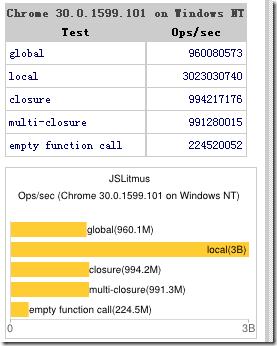js 性能基准测试工具-告别可能、也许、大概这样更快更省
平时写js经常遇到这样做是不是更快点?但又没有具体简单可测试的工具,最近也倒序看博客园司徒正美 js分类下的文章
【ps:去年灵光一闪,发现看博客园排名前100的博客、按照文章分类倒序看是学习最快的方式 O(∩_∩)O~】
看到这篇文章时 (转)Google Closure: 糟糕的JavaScript http://www.cnblogs.com/rubylouvre/archive/2009/12/07/1615593.html
文中有些 性能优化对比的举例,让我想起去年我寻找js性能基准测试工具、jsdom操作测试工具、js单元测试工具
今天分享下我找的一个js性能基准测试工具---JSLitmus
JSLitmus是一个轻量级的工具,用于创建针对性的JavaScript基准测试工具
JSLitmus 有很多优点 简单易用、1分钟就学会了
这是官网地址:http://www.broofa.com/Tools/JSLitmus/
官网例子 2 http://www.broofa.com/Tools/JSLitmus/demo_test.html 这个里面有很多测试用例 O(∩_∩)O~
使用JSLitmus 做性能基准测试的基本步骤
创建一个静态页,引入JSLitmus.js ,然后调用JSLitmus 的基本方法就可以了 例如
<script src="JSLitmus.js"></script>
<script>
JSLitmus.test('Empty function test', function() {});
</script>
这个空的执行函数会显示每秒实行无数次
这个函数还可以传递一个参数,官网说的我不是很明白,大概意思是通过传递这个参数可以获取更加准确的执行结果.,
通过count可以细节的控制循环,(ps:个人感觉就是由自己控制循环…)
JSLitmus.test('a non-looping test', function(count) {
while (count--) {
// Your test code goes here
}
});
这个性能基准测试工具可以看到
1 使用内存的情况,
2多长时间内执行了多少次
个人感觉这两个指标基本够用了,而且支持多浏览器,对与ie浏览器,执行时间太长会出现卡死,需要特殊配置,具体配置文章结束再说
这里可以看一下官网举得例子
1 测试对全局变量进行访问和修改的性能
// First, test a variable in the global scope
var global_var = 1;
JSLitmus.test('global', function(count) {
while (count--) global_var++;}
);
2测试对局部变量进行访问和修改的性能
// Now test one that's in a function's local scope
JSLitmus.test('local', function(count) {
var local_var = 1;
while (count--) local_var++;
});
3测试在一个闭包中,对上一级变量进行访问和修改的性能
// Try a variable bound to a closure function. Prototype and JQuery developers
// should find this particularly interesting.
JSLitmus.test('closure',
(function() {
var closure_var = 1;
return function(count) {while (count--) closure_var++;}
})()
);
4两次闭包,最里面的闭包访问爷爷级别的变量的性能【ps:作者太奇葩这样的函数写出来,不过这里count咋用我学会了。。】
// Closure binding again, but this time with the variable bound through nested
// closures.
JSLitmus.test('multi-closure',
(function() {
var multi_var = 1;
return (function() {
return function(count) {while (count--) multi_var++;}
})()
})()
);
5测试对一个引用空函数表达式的调用
// Test an empty function call, which we can use as a reference point
JSLitmus.test('empty function call', function(count) {
var f = function() {};
while (count--) f();
});




 浙公网安备 33010602011771号
浙公网安备 33010602011771号